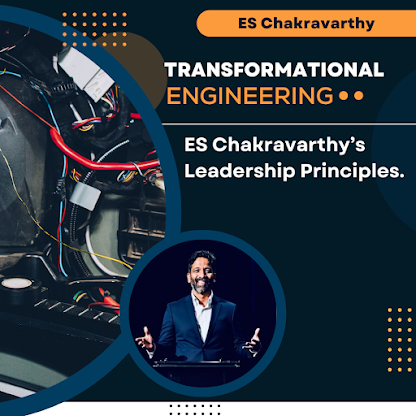Engineering Students and Automation: ES Chakravarthy’s Advice for a Bright Future
Automation, in today's fast-developing era of technology, has now become the most essential thing in the modern engineering industry. For students pursuing a career in this dynamic field, understanding automation is no longer optional but necessary. ES Chakravarthy inventor of engineering thoughts- encourages aspiring engineers to get ready for the unknown future with automation issues and to learn about the tangles of automation.
Embrace the Evolution of Technology
Automation is transforming industries, streamlining processes, and creating unprecedented opportunities. Chakravarthy opines that Engineering students can or must seek to work in these change modes actively. “Technological evolution cannot be stopped,” he says. Instead, it is time to adapt to it and use this new avenue to promote advancements.
To keep yourself at the cutting edge, Chakravarthy suggests, be well versed in the latest tools, software, and methodologies in automation. This includes artificial intelligence, robotics, and the Internet of Things, which are the three pillars of automation shaping the future of engineering.
Develop a Strong Foundation
Automation thrives on a solid understanding of engineering principles. ES Chakravarthy also stresses how essential it is to have control over core competency areas such as mechanics electronics and computer science.
“The question of automation, therefore, cuts across different fields,” he says. “In my opinion, learners require a novel teaching strategy that includes the theoretical part together with the practice.”
With the right academic foundation laid foundations, engineering students can independently approach complicated automation issues and contribute towards finding solutions.
Cultivate Problem-Solving Skills
Automation is essentially tied to a set of models to be applied in an effective problem-solving way. Chakravarthy also enforces critical thinking skills among students by solving the case studies. He advises them to take on activities in projects, internships, competitions, and other concerns that will challenge them to use their creativity in arriving at unique solutions.
ES Chakravarthy adds that “Problem-solving is at the heart of engineering”. “Automation escalates the consequences of solutions which is why engineers need to address problems with openness and creativity.”
Focus on Lifelong Learning
Chakravarthy has provided five key lessons the first of which is never to stop learning. Automation technologies are continually evolving, and staying updated is essential for maintaining relevance.
"He believes that one need not end learning of formal schooling instead of pursuing higher certifications, obtaining post-graduate education, and hands-on participation at education forums,". 'Education of an engineer doesn't end with a degree,' he affirmed...' It's a journey of continuous learning and adaptation throughout one's lifetime."
Collaboration and Teamwork
It is common to have multidisciplinary and multicultural teams throughout the automation process. He focuses on the question of cooperation, information sharing, and teamwork.
“Appropriate inter/intra personal skills particularly in effectively working with others is another important characteristic of great engineers,” he says. “Automation is all about pooling resources together with people from within the organization.”
Ethical Engineering Practices
Chakravarthy challenges engineering students to focus on the sustainability, safety, and social responsibility of what they produce. He also said that if engineering is done correctly, it is very important for society because automation has the potential to improve the lives of individuals.
Prepare for a Bright Future
Engineering students Chakravarthy’s insights for success namely: accepting technology change, laying a good ground, developing problem-solving ability, creating a continuous learning culture, and promoting teamwork, and integrity are very comprehensive strategies for success.
In other words, ES Chakravarthy infers, “automation is not isolated to machines and algorithms.” ‘This is all about giving authority to engineers and letting the future engineers design a better, smarter, and above all a sustainable world.’
Engineering students interested in automation should be able to follow the guide above in order to step out with confidence and be at the frontline to revolutionize the future.


.png)

Comments
Post a Comment